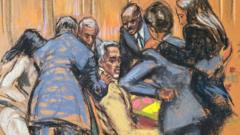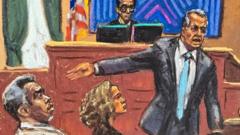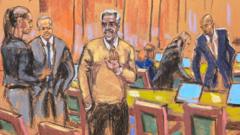Following serious instances of false citations generated by A.I., the High Court warns that lawyers may face prosecution for misleading use of technology in legal arguments.
High Court Issues Warning to Lawyers on Misuse of A.I. in Legal Proceedings

High Court Issues Warning to Lawyers on Misuse of A.I. in Legal Proceedings
The High Court of England cautions legal professionals against using fabricated A.I.-generated content in court cases.
The High Court of England and Wales has issued a stern warning to legal professionals regarding the potential for criminal prosecution if they present fabricated information generated by artificial intelligence tools. This warning follows several recent incidents where lawyers cited non-existent quotes and rulings in court documents.
In a significant statement, one of the UK's top judges, President of the King’s Bench Division, Victoria Sharp, declared that the current guidelines for legal practitioners are inadequate to combat the misuse of A.I. in legal settings. She remarked that urgent measures are necessary to protect the integrity of the justice system.
Sharp, alongside fellow judge Jeremy Johnson, referenced two specific cases where A.I.-generated content was incorporated into legal arguments. In one instance, a claimant confessed to the creation of "inaccurate and fictitious" materials through A.I. during a lawsuit against two banks, which was dismissed. Another case, concluded in April, involved a lawyer who could not provide explanations for the inclusion of multiple non-existent cases in her client’s arguments against the local council.
Using rarely invoked judicial powers, Judge Sharp underscored the need for the court system to maintain its integrity and suggested serious repercussions for lawyers found using misleading A.I. content, including the risk of criminal charges or disbarment. "There are serious implications for the administration of justice and public confidence if artificial intelligence is misapplied," she cautioned, emphasizing the importance of truthful representation in legal discourse.
In a significant statement, one of the UK's top judges, President of the King’s Bench Division, Victoria Sharp, declared that the current guidelines for legal practitioners are inadequate to combat the misuse of A.I. in legal settings. She remarked that urgent measures are necessary to protect the integrity of the justice system.
Sharp, alongside fellow judge Jeremy Johnson, referenced two specific cases where A.I.-generated content was incorporated into legal arguments. In one instance, a claimant confessed to the creation of "inaccurate and fictitious" materials through A.I. during a lawsuit against two banks, which was dismissed. Another case, concluded in April, involved a lawyer who could not provide explanations for the inclusion of multiple non-existent cases in her client’s arguments against the local council.
Using rarely invoked judicial powers, Judge Sharp underscored the need for the court system to maintain its integrity and suggested serious repercussions for lawyers found using misleading A.I. content, including the risk of criminal charges or disbarment. "There are serious implications for the administration of justice and public confidence if artificial intelligence is misapplied," she cautioned, emphasizing the importance of truthful representation in legal discourse.





















